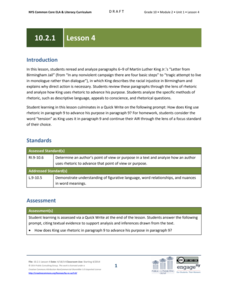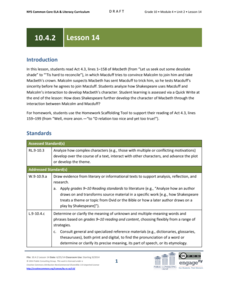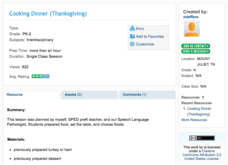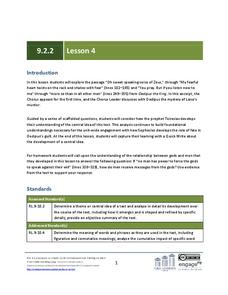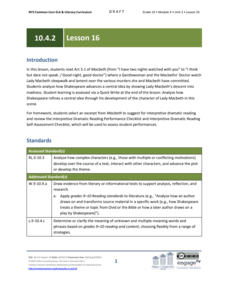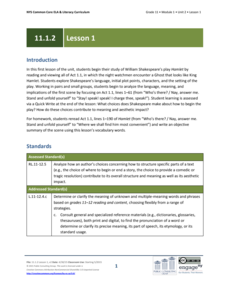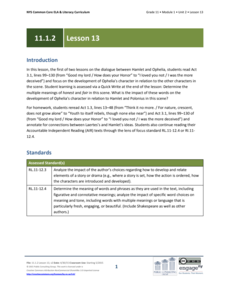Federal Reserve Bank
Lesson 4: Back to School
Based on your current level of human capital, how long would it take you to earn $1,000,000? What about your potential human capital? Learners explore the importance of education and experience when entering the workforce, and compare...
Ned Show
Rainbow Fish and the Big Blue Whale
If friendship were a soup, what ingredients would be in it? As part of a study of Marcus Pfister's Rainbow Fish and the Big Blue Whale, kids engage in a series of friendship-themed activities using materials contained in this richly...
EngageNY
Organizing an Opinion, Reasons, and Evidence: Text 2 for Each Expert Group
The proof is in the reading. Using the informative resource, scholars read a second article about either Althea Gibson or Roberto Clemente. As they read, they continue adding reasons and evidence to their graphic organizers to show how...
EngageNY
Grade 9 ELA Module 2, Unit 2, Lesson 8
Prophecy and blindness often go hand in hand, as in Sophocles' Oedipus the King. Explore Oedipus' thoughts about prophecy, fate, and responsibility with an activity focused on the discussion between Creon and Oedipus regarding the murder...
EngageNY
Grade 9 ELA Module 4, Unit 1, Lesson 11
As part of a study of how writers structure their text so that readers understand events, class members do a close reading of "Is It Lawful to Make Slaves of Others Against Their Will?" a chapter in Aronson and Budhos' Sugar Changed the...
EngageNY
Grade 9 ELA Module 4, Unit 1, Lesson 19
Building on the previous discussion of the supplemental reading article "Where Sweatshops Are a Dream," class members use the provided Evaluating Argument and Evidence Tool to identify the claims and evidence Nicholas Kristof uses to...
EngageNY
Grade 10 ELA Module 2: Unit 1, Lesson 4
Just read between the lines. Scholars analyze rhetorical devices in Martin Luther King Jr.'s letter by first discussing them with guided questioning. They then complete a rhetorical impact tracking tool before finishing the lesson plan...
EngageNY
Grade 10 ELA Module 4: Unit 2, Lesson 14
How does Shakespeare further develop Macbeth's character using the interaction between Macduff and Malcolm? Pupils write responses to the question. They continue their analysis of Macbeth with a masterful reading and guided whole-class...
EngageNY
Grade 10 ELA Module 4: Unit 2, Lesson 13
Lady Macduff uses a metaphor to suggest that her husband does not possess the courage of even a tiny, short-winged bird—ouch! Using the resource, pupils discover Act 4.2 of Shakespeare's Macbeth. Using reading, writing, and discussion,...
EngageNY
Grade 11 ELA Module 1: Unit 2, Lesson 7
Following a ghost's advice may not be in anyone's best interest, but that doesn't stop Hamlet! Using an exciting resource, pupils continue reading Act 1 of Shakespeare's Hamlet, in which the ghost tries to convince Hamlet to seek revenge...
Scholastic
Cooking Dinner (Thanksgiving)
American traditions of Thanksgiving come to life through culinary activities. Young chefs practice cooking a turkey and setting a table for a Thanksgiving family feast. They use math and reading skills to follow directions and measure...
EngageNY
Grade 9 ELA Module 1, Unit 1, Lesson 9
Find the central idea in an excerpt from Karen Russell's "St. Lucy's Home for Girls Raised by Wolves" with a literary analysis lesson. As your class analyzes a section of the story, they determine how the author forms the central idea...
EngageNY
Grade 9 ELA Module 1: Unit 3, Lesson 18
Why is Romeo and Juliet considered a tragedy? Class members conclude their reading of the play, focusing on the final lines of Act 5, scene 3. They also consider how Shakespeare structures the text, orders events, and manipulates time to...
EngageNY
Grade 9 ELA Module 2, Unit 2, Lesson 4
The concept of sight, whether it's a lack of sight or abundant sight of the future, plays a vital role in Sophocle's Oedipus the King. Develop your ninth graders' literary vision with a lesson that connects the prophecy of Teiresias to...
EngageNY
Grade 9 ELA Module 4, Unit 1, Lesson 18
As first-year students continue to investigate how sugar changed the world, the focus shifts to a consideration of why people with limited job options take on dangerous or subjugating work. Class members read an opinion piece by Nicholas...
EngageNY
Grade 10 ELA Module 4: Unit 2, Lesson 16
How do complex characters develop throughout a text? Pupils read Act 5.1 from Shakespeare's Macbeth, which depicts Lady Macbeth's descent into madness. Using discussion and writing exercises, scholars analyze how Shakespeare develops...
EngageNY
Grade 11 ELA Module 1: Unit 3, Lesson 3
Virginia Woolf didn't believe a woman could have written Shakespeare's works. Using the resource, scholars engage in a silent discussion to analyze how Woolf uses rhetoric to convey her point of view in A Room of One's Own. Pupils write...
EngageNY
Grade 11 ELA Module 1: Unit 2, Lesson 18
How does the comparison of Hamlet to Fortinbras develop Hamlet's character? Scholars complete a Quick Write to answer the question. They also continue their exploration of Shakespeare's Hamlet, reading and discussing Act 4.4.
EngageNY
Grade 11 ELA Module 1: Unit 2, Lesson 14
How do Ophelia's interactions with Hamlet help develop her character? Pupils continue reading Act 3.1 from Shakespeare's Hamlet. Using writing and discussion, scholars analyze the dialogue between Hamlet and Ophelia, paying particular...
EngageNY
Grade 11 ELA Module 1: Unit 2, Lesson 1
How can an author's decisions impact a text? Using an insightful resource, scholars begin their study of Hamlet by reading Act 1.1. They explore the language, characters, and setting in small groups. Upon finishing group work, pupils...
EngageNY
Grade 11 ELA Module 1: Unit 2, Lesson 13
What impact does word choice have on character development? Using the resource, scholars read Act 3.1 from Shakespeare's Hamlet, focusing on the development of Ophelia's character. They also complete a Quick Write to analyze the meaning...
EngageNY
Grade 9 ELA Module 4, Unit 1, Lesson 13
Class members conclude their reading of the supplemental text, “Bangladesh Factory Collapse: Who Really Pays for our Cheap Clothes?” and use the provided Evaluating Argument and Evidence Tool to analyze the evidence Anna McMullen uses to...
EngageNY
Grade 9 ELA Module 4, Unit 1, Lesson 4
Class members continue examining how writers develop and support their ideas by comparing two texts about globalization. Alongside chapters from Sugar Changed the World, young scholars read an article by the World Bank entitled...
EngageNY
Grade 9 ELA Module 4, Unit 1, Lesson 3
What is the connection between the spread of ideas and the expansion of the sugar trade? Class members continue their reading of Sugar Changed the World and use an analysis tool to identify how critical ideas in the chapters are...








